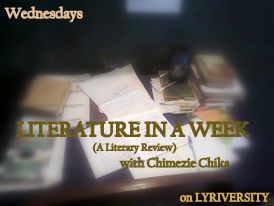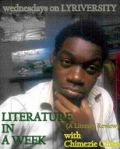
Reviewer: Chime Justice Cjn Ndụbụisi
To read the Poem click here: ON THE MEANDERING PATHWAYS OF LIFE (Poetry)
Poetry is a serious business. Serious in the strictest sense. This is because it dates back to the beginning of the world where the first recorded utterance of man is poetry. In Genesis 2 vs 23; Adam said, “This is the bone of my bones/And flesh of my flesh.” From that moment onwards, man came under the sway of poetry which becomes the foundation upon which history stands; the history of the past, the present and the future.
I’m not really a critic in the strict sense of the word and I find it a herculean task to do. However, I’m entering into the critique of On The Meandering Pathway of Life in terms and or in form of a ‘verbal structure’ which Rev Prof A.N Akwanya in his book, Verbal Structures (2004: 1) says is the structural:
“Analysis of the work as an individual utterance in order to determine its basic elements and establish its form.”
This he argues would help us pick and focus our attention upon a limited range of phenomena to which the poem strictly applies.
One basic benefit of reading a poem in this manner is that it highlights the things that distinguish it as a poem. And “these things are not its themes…since even such great themes as Oedipus Relation has become a key formative in the discourse of the psychological sciences; similarly, it is impossible to determine whether diabolism, another recurring theme, belongs properly to literature or to religious thought” (1).
The above is the hypothesis upon which my discourse of the poem stands. But before we proceed, I’d want also to make a distinction between the characters in a work of art or persona in the case of the lyrical, and the narrator, as distinct from that of the author, this is because I’ve seen many of us in Lyriversity use such phrase as ‘the poet narrator tells us’, ‘the author says’, etc. The author is like a midwife who helps in the delivery of the child. There’s no where or how on earth she can lay claim to the paternity of the child. In essence, the poet, author of a work of art dies the moment the work is published. It is his only in terms of the ‘ownership’ of the work (intellectual property). He has no hand or say in whatever happens in the text anymore, except as a disinterested and impersonal reporter in which case his words are not final. This goes to say that the characters are the people that people the text whereas the narrator is usually what most scholars calls ‘the points of view’: namely, the first person, the omniscient, and the third person point of views. The narrator is such that in most cases, takes the character’s or persona’s words and sometimes mis-apply them, thereby causing a kind of disagreement which we shall see later.
Having said the above, it’s imperative to say that this poem starts on a high note:
“The awakening of the sun at dawn…” line 1
The personification in this introductory line of the poem cannot go unnoticed as it ushers us into the celestial and gives us a glimpse of what we are to encounter further down:
“Something beyond this world/Beyond this life I see.” lines 5 and 6
Meanwhile, we are forced to ask this rhetorical question: ‘the awakening’ by who? Your answer is as good as mine, but one sure thing it does is to alert our sense of natural and supernatural phenomenons and our appreciation of the fact that even without our consent, the sun, without which life on earth is dead, wakes up everyday.
Worthy of note is that the poem combines the services of a narrator and that of the persona. The persona is seen narrating his own experience from the first person’s point of view using the personal pronoun ‘I’ starting from line 6 where we read:
“Beyond this life I see. I hear clearly…”
Prior to this point, it was the voice of the omniscient narrator we hear prying into the deepest part of the earth and beyond where ordinary human eyes can not penetrate. This is not for no reason though since it opens our eyes to the nature and manner of action, the persona of the poem is involved in.
It can be said that he is a human, yet is capable of functioning at a level outside the limits of natural laws. This is inherent in the following lines:
“I’m just a simple man in simple shoes,
With my simple shirt tucked in simple shorts.
My heart in my hand, my hand on my head,
I walk through meandering pathways of life.” lines 22-25
In the above, there’s a tint of dramatic irony in the sense that not only is the persona a ‘simple man’, he also performs magical acts like having his ‘heart in his hand’ yet keeps living, an act which is not just an exaggeration, but a kind of paradox in the sense that the idea of simple is immediately shattered by the performance itself. Here, the narrator tells us one thing different from the actions of the persona: they disagreed albeit working together.
Besides that, we’ll quickly recall that similar situation played out in Sir Gawain and the Green Knight where Bertilak the green knight’s head was cut off, yet he carried it in his hand out of King Arthur’s Court after he had successfully mocked Arthur’s knights. In works of this kind, the reader is constantly ushered into the world of the marvellous where natural elements are stopped, which in itself is an aspect of romance. In the poem under focus for instance, we read further and we marvel at the kind of ‘simple’ human who could journey “equal miles in equal breath/Equal grass in equal grace…” lines 27-28
This human seems larger than life in the sense that he is “In the world but not a part of the world” (line 30), a feat not all of us can perform.
Further reading confirms that he is human afterall, and not immune to supernatural forces like fate and fears. Thus, his kowtowing to both natural and supernatural forces makes it possible for us to find him ‘adrift at sea’ like a ‘log in the ocean’ and this is also attested to in the following lines:
I cannot will myself to run freely/Nor break from travel, I’m bound to this path. lines 38-39
Perhaps, the path of adventure on the “…road that stretches on eternally
From one history’s page unto another,
From the infant rocking on cradle bed
To the poet, the potter, the prostitute,
The man, the woman lost in the moment.” lines 54-58
From our discourse so far, given the unstable environment or setting where the marvellous and wondrous are commonplace, it’s easy to see the poem from the aspect of romanticism which starts as a movement derived from the old school of metaphysics that goes back to Aristotle. But Akwanya assures us that “romanticism is the great celebration of life, especially in the forms in which scientific discourse cannot encompass it” (2). He further made mention of some postulates of romance as including, “…adventure, especially through primeval forests and uncharted wilds, and journey in quest of some mysterious object.” –50 Years of Nigerian Novel (Akwanya, Anohu 2001: 10). But Northrop Frye in his Anatomy of Criticism makes specific mention of the nature and characteristic features of a romance persona. He says that “the persona of a romantic quest sequence moves in a world in which ordinary laws of nature are slightly suspended: prodigies of courage and endurance, unnatural to us are natural to him, and enchanted weapons, talking animals, terrifying ogres and witches, and talismans of miraculous power violate no rules of probability once the postulates of romance have been established (1957: 33).
Now let us take and identify these postulates one after the other from the poem.
‘A world where ordinary laws of nature are suspended’:
“I am a part of everything that exist,
Yet distinct from all in the minutest
Of thoughts, in my words and in my actions.
I shared my dreams among the wild flowers.
My eyes I have lent to the bats to see.
My ears I’ve given to Shepard and sheep,
Each with equal passion and attention.
I’ve left my tongue to the hawkers to use.” lines 43-50
In the above, we have no doubts that the persona lives in a different kind of world because the acts above are surely not natural to ordinary human being.
‘Prodigies of courage and endurance, unnatural to us are natural to him’: we see this in the following lines where notwithstanding the unmapped path, the persona courageously forges ahead in his quest when chicken-levered men would naturally have turned back:
“The perennial road of life is untarred.
It is filled with debris, pot-holes and mud.
I’ve searched for a smooth area and found none.
Night or day, Life’s holds no happy ending
For the poor souls striving still upon it,
For it’s the greatest tragedy there is.” lines 60-65
In the above also the persona exhumes the archives where the history of suffering is hidden, where tragedy is lodged. This is the primal tragedy that can be traced to the beginning of things. Here, the road is uncharted and rough and the persona is faced with all sorts of discouragments in terms of physical obstacles, yet he moves on courageously and enduring it all.
Although we may not see an ‘enchanting weapon’ in the strict sense in the following lines, but when one is,
“A puppet for the master puppeteer/Pulled by invisible levers and strings,” (lines 73-74) we could make due. Besides, what could be more enchanting than being pulled by an unseen hand?
Further down, we see ‘talking animals’ in Nightingales and cocks making utterances in terms of singing songs and crowing respectively.
Akwanya and Anohu tells us that the literary epic and its derivatives, such as the heroic romance and the quest romance (such as we are treating) generally involve a movement of homecoming. It also involve an outward journey (2001:16).
Now in support of the above, towards the end of the poem we read:
“Perhaps there is a peaceful place for me
To go and rest my heavy heart and feet,
A home beyond the mountains and the streams.” lines 82-84
The fantasy of there being other invisible worlds attached to the human world where humans can go at the exhaustion of the current life, worlds whose order and internal working directly or indirectly helps to shape that of humans, is one of the most universal of all mythic ideations. And I’m of the opinion that one lifetime, whether long or short, is already enough for any human.
The persona seems to be torn between the above assertion of mine, and we hear him reiterating:
“I will never know till all is done/And I will never know till I am gone.” lines 85-86
Here, I refused to toe the path many readers would want to toe. I had to fight off the temptation to say that ‘gone’ as used above means to cease from existing. My reason is inherent in the following lines which say:
“It’s evening, the moon is up in the sky/The stars have all descended from above.” lines 87-88
In the traditional society, which is the setting of the poem, when the moon is up in the sky, it denotes playtime for children and an avenue for hunters to go out into the bush in search of games. So if ‘gone’ is in the sense of death, the poem would have finished before ‘evening’ is ushered in again. But the introduction of the ‘evening’ and ‘moon’ and ‘stars’ only confirm one thing; the continuation of the adventure with a much more pronounced zeal and determination. We read further:
“And I, who is but a trespasser here/Must find a shelter for my thoughts tonight.” lines 89-90
The persona is not ‘done’ yet, he must finish his quest. But his quest’s object of ‘shelter for thoughts’, does not have a home nor does it need one. ‘Must’ as used above is a sort of vow, which shows the persona’s resolve to see the end of his adventure, but quests of this kind are not easily finished, especially when the object of the quest is something as intangible and temporal as ‘a shelter for thoughts’ and ‘the strength to dream’. Now let me elucidate at this point that the nature of romance is one that makes for indefinite actions such that so long as there are more quests to embark, the narration may never end. Thus we read:
“And I, who is but a foreigner here
Must find the strength to dream once and again,
Till the night brings rest to my wand’ring feet,
Or the cock’s crow wakes me free and no-more.” lines 93-96
‘Once and again’ as used above signifies that ‘the strength to dream’ has been found before. And even if it is found again, there’s every possibility that it may exhaust again to prompt another quest altogether. The probability and impossibility of an ending is entwined in the last two lines, namely; that no matter how personified ‘the night’ may be, it does not have the ability to perform human attributes in the actual sense. However, the sound of a cock’s crow may wake one up for free, but never ‘no-more’ because each generation of cocks must continue to crow.
In conclusion, Mr Solar’s On the Meandering Pathway of Life, is a poem that carries the burden of the history of struggling and suffering. It carries with it too the myths of origin and myths of recapitulation or summing up of all things in the origin from which they began. Here man is confronted with what is more than man: fate and tragedy, but man insists on struggling to survive. But his insistence is not without a price, a price he has chosen to pay. Thus even when he found himself walking on the road of life filled with debris, pot-holes and mud, he continues his quest. This is the great path of majority of tragic personas, they make the choice themselves to carry the burden of others on their shoulder. Thus we read:
“Fate disguised as free-will, I make my choice.
Silver or suicide, my choices are vague
And I will never know…” lines 75-77
We read again in the poem:
“Chasing still an ever-elusive dream
Of justice and equality, of life
Without prejudice, without suffering.
The yellow leaves of human lives fall still;
Broken and stale, fall still on those areas
Where childhood mem’ries are loose, eroded
By time. I sigh, and from my window pane
I gaze at the cross-roads of human choice,
Human dreams and human aspirations,
Put on a face and faith; straws of smiles
To mask my fears, and step into the world…” lines 11-21
Stepping into the world here is an act of faith which man does for survival sake.
Mr Chime Justice Cjn Ndubuisi writes from Lagos. You may reach him on twitter: @legendaryCJN
Lyriversity — Liberty of Creativity













